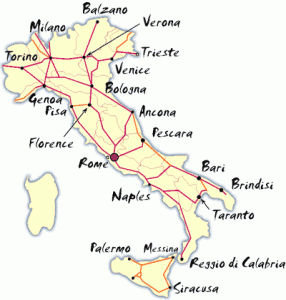One kilometer east of the Bologna station the Eurostar City train (a regular, not-so-fast locomotive pulling cars redecorated inside to look like the usually speedy Eurostar line), traveling from Bari (in the Achilles tendon of Italy) to Milan, slowed to a crawl. Those planning to get off in Bologna were already standing, suitcases at the ready, in the aisles to quickly debark. The train stopped, the lights went out, the air conditioning quit, and the emergency lights came on. The station was not in sight.

Two minutes passed and so did the well-lit Alta Velocità train (Italy’s fastest) with small LED panels on each door informing the City train passengers that its route was from Rome to Milan. The intercom system squawked static. “Cosa?” “Eh?” “Che dice?” echoed around the packed car. The sharp of hearing answered, “Questo treno è guasto.” Guasto – a great word – sounds as broken as its meaning. Not delayed. Not waiting for some other train to clear the station. Broken. After six hours of steady forward motion, the Bari to Milan train had stopped, broken, with five dark tracks on one side and four on the other.
The debarkers turned as one, wheeling luggage back to their reserved seats, ejecting those who had thought to improve their positions for the last two hours to Milan. The lights flashed on along with air rushing through the ventilation system. Two minutes later both died again.
The speakers barked out another message with the words “trenta minuti” repeated twice. Thirty minutes. Groans. Cell phones flipped open.

Three ganzo guys, dressed alla moda, with big laptops on which for the past three hours featured interactive calcio games and a film with Cameron Diaz dubbed in Italian, cracked jokes about “senza benzina.” Another said this was like the Alitalia airline running out of gas. A frizzy-haired businesswoman from Milan popped in another fragrant wad of green apple bubblegum and resumed reading the wisdom of Eckhart Tolle in the dim light.
Thirty minutes passed. Those going to Florence watched their train (the last connection scheduled for the night) zip past going the opposite direction. The air was growing warm and humid. Someone started to smoke a forbidden cigarette in the foyer outside the toilette. A man chewed on a panino con mortadella. A bologna sandwich outside of Bologna – there was a strange sort of symmetry.
Exactly one hour after the Eurostar City sputtered to a stop, it started to back up and then crept forward. The lights came on and stale air blew through the car. “Come l’Italia,” said one person. Another responded that to be truly Italy the train would have broken down for three hours in a tunnel with no lights or air conditioning, as had been reported just the month before in the newspapers.
The Bari-Milan Eurostar City pulled into the Bologna Central Station.
The loudspeaker cackled. The Milanese lady swore and others groaned. This train was going no further. Everyone off. The Milan-bound passengers were directed to another platform. All others were told to go to the Ufficio Assistenza Clienti.
More than one hundred grumpy people swarmed into a long room where a slender young woman in a dark green uniform peered at a computer, flipped through some tattered pages and then turned to stare at the blinking PARTENZE screen high on the wall behind her desk. The travelers became more insistent as it became clear that the last train leaving Bologna in any direction was departing in less than forty minutes. She did a heroic job. Soon the Florence-bound passengers were running to catch the night train to Calabria leaving on Track Three.
The train to Calabria was an old beat up regional train with broken fixtures, stained seats and the lingering odor of recent meals and long ago tobacco. This was the train that inspired letters to the editor about lice and bedbugs (although the only beds were seats pulled together). Groups of young toughs and tired illegal vendors paced through the corridors from car to car. The few women sought out each other for company for the nightlong haul to the southern tip of Italy.
The train was forty minutes late pulling in to Florence and didn’t stop at Stazione Santa Maria Novella in the center of the city, but rather at a small squalid, brightly-lit station on the southern edge of town.
Nine and a half hours after leaving Bari even the periphery of Florence looked welcoming and the surly twitchy cab driver with the dirty ancient taxi was a gift.
